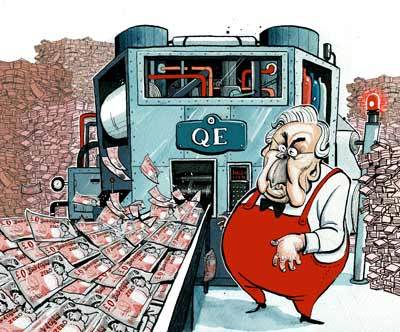Fire up the printing presses, once again. The Bank of England has just announced another £50 billion of Quantitative Easing, bringing the total monetary expansion up to £325 billion. And it probably won’t end there: Citi, among other analysts, forecast that it could go as high as £600 billion next year.
So what are we getting for all this free money? The Bank would tell you that its supporting the economy: keeping interest rates down and encouraging investors to flush money into growth-inducing schemes and mechanisms. And there’s obviously truth in that. But we, and the suits of Threadneedle St, shouldn’t pretend that QE doesn’t create victims too — and it is those victims that we highlight in the latest issue of The Spectator.
Here’s how Nassim Taleb, purveyor of Black Swans to David
Cameron, describes it in an interview with Fraser:
And, in a separate article, Bill Jamieson details what he calls ‘possibly the greatest gamble in British economic history’:‘“Quantitative Easing is a transfer of wealth from the poor to the rich,” he says, “It floods banks with money, which they use to pay themselves bonuses. The banks have money, and assets, so they can borrow easily. The poor guy, who is unemployed and can’t borrow, is not going to benefit from it.” The QE process pushes asset prices up, he says, which is great for those who own stocks, shares and expensive houses. “But the state is subsidising the rich. It is the top 1 per cent who benefit from Quantitative Easing, not the 99 per cent.”’
The Bank justifies its action today by saying, ‘without further monetary stimulus, it was more likely than not that inflation would undershoot the 2 per cent target in the medium term’. But, as Bill Jamieson says, why should we place unswerving faith in the inflation forecasts of an organisation that has a particularly patchy record in this area? Mervyn King & Co are enacting radical policy, and with too few questions asked.‘Low rates of interest are, of course, great news for a government which needs to borrow £4,000 a second — but not for savers who see the value of their nest egg destroyed by inflation. It hurts pension funds, so what we think we’re putting towards retirement will be worth far less. Companies see the value of their pension fund plunge — and have to top it up. This is what QE does: transfers wealth from savers to borrowers. If the Chancellor stood up and admitted as much, it would cause uproar. But because QE is a complex Bank of England mechanism with a boring name, no one much cares. We need not guess at its effects. The Bank’s own analysis has confirmed that the first £200 billion of QE pushed up inflation by anything from 1 to 2.6 percentage points. This was slipped out in the small print of a Bank report, barely making a ripple. Compare this to the political outcry which surrounded the 2.5 percentage point rise in VAT last January. Every household had to pay considerably more for shopping due to QE, too, and, as with VAT, it has hit the poorest households hardest.’






Comments